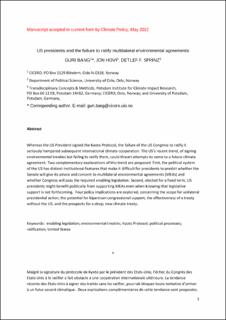US presidents and the failure to ratify multilateral environmental agreements
Peer reviewed, Journal article
Submitted version
Permanent lenke
https://hdl.handle.net/11250/2753896Utgivelsesdato
2012Metadata
Vis full innførselSamlinger
- Journal articles [478]
Sammendrag
Whereas the US President signed the Kyoto Protocol, the failure of the US Congress to ratify it seriously hampered subsequent international climate cooperation. This recent US trend, of signing environmental treaties but failing to ratify them, could thwart attempts to come to a future climate agreement. Two complementary explanations of this trend are proposed. First, the political system of the US has distinct institutional features that make it difficult for presidents to predict whether the Senate will give its advice and consent to multilateral environmental agreements (MEAs) and whether Congress will pass the required enabling legislation. Second, elected for a fixed term, US presidents might benefit politically from supporting MEAs even when knowing that legislative support is not forthcoming. Four policy implications are explored, concerning the scope for unilateral presidential action, the potential for bipartisan congressional support, the effectiveness of a treaty without the US, and the prospects for a deep, new climate treaty.
